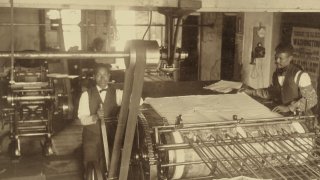
A former Black community newspaper will be commemorated in a special license plate if Virginia House lawmakers give the bill its final stamp of approval.
Sen. Joseph D. Morrissey, D-Richmond, introduced Senate Bill 753, which will authorize the issuance of a special license plate celebrating The Richmond Planet newspaper. Lawmakers in the Senate passed the bill unanimously. The House Transportation committee unanimously approved the measure Thursday, and it will now be considered by the entire House.
The Planet was founded in 1882 by 13 formerly enslaved men, most who were Virginia public school teachers, according to the Library of Congress. A Black flexed bicep with shockwaves emanating from the arm served as the masthead design. The same symbol and the title of the newspaper will be incorporated into the license plate.
We're making it easier for you to find stories that matter with our new newsletter — The 4Front. Sign up here and get news that is important for you to your inbox.
Edwin Archer Randolph, the first Black man to graduate from Yale Law School, served as The Planet’s first editor, according to the Library of Congress. Two years later, John Mitchell Jr. assumed power and led The Planet for the next 45 years. Mitchell was considered the “fighting editor” for his fight against injustice through his work.
Reginald L. Carter launched the effort to have the special plate. He was in search of a license plate for his personal vehicle, but Carter said he was uninterested with the available options. He came across the idea of creating a new plate in celebration of Black excellence. Carter described the process as “tedious but not impossible.”
Carter said he also worked on other projects in his hometown of Tappahannock. He worked to remove a Confederate statue, which the town council later voted to contextualize, and memorialize a lynched man from Essex County with a highway marker.
Mitchell’s family supports the idea.
“His great, great nephew, who’s also named John Mitchell, is on the board for The Richmond Planet Foundation,” Carter said. “They’re in full support of the plate, so I couldn’t have asked for a better family or representative to develop a plate after.”
The Planet covered local, national and worldwide news. It fought for equal rights, education, voting and segregation, according to Black Virginia, a project by University of Richmond students that highlighted the newspaper’s importance. The paper also offered advice and positive news.
The Planet was bought in 1938 by The Baltimore Afro-American, according to the Library of Virginia.
Journalist Hazel Trice Edney previously worked for the Richmond Afro-American and Richmond Free Press newspapers. Edney said she conducted an independent study at Harvard University to compare the “fighting editor” styles of Mitchell and Raymond Boone, who established the Richmond Free Press in 1992. Boone was known as a “crusader of justice” and had a strong voice in the Black community.
“To have him on a license plate established in the former capital of the Confederacy and around the commonwealth of Virginia says that we do understand the fight that John Mitchell undertook,” Edney said.
The distribution and approval of the use of the new license plate is based on the ability to acquire and submit at least 450 prepaid applications, according to the bill impact statement. Carter set up an email where application and preorder inquiries were sent.
Dream for a Purpose, a marketing agency, designed the plate.
The JXN Project, an organization to preserve and explain the pivotal role of the Jackson Ward neighborhood as one of the nation’s first historically registered Black urban neighborhoods, supports Carter’s endeavor.
“We felt a responsibility to help Reggie and his campaign become the first license plate of its kind,” Sesha Moon, executive director and director of research of The JXN Project, stated in an email.
Carter worked tirelessly to collect signatures traveling throughout the state, according to Moon. He recruited Morrissey to introduce the legislation.
Mitchell’s great, great nephew, Carter and Morrissey spoke in support of the bill during the Senate hearing. Morrisey reported earlier in the month that Carter had 497 prepaid orders for the plate.
The estimated cost is expected to be just over $16,000 and will require 218 staff hours, according to the bill impact statement. Revenue from the cost of the plates—$10 for a standard plate and $20 for personalized—and future sales will cover the cost of implementation.
The plate can stay in production if 200 plates are issued within five years for the Department of Motor Vehicles to continue the issuance of plates, according to Virginia’s Legislative Information System.
“My end goal is contextualization,” Carter said. “You can’t tell American history without telling African American history, and you can’t tell Virginia’s history without telling The Richmond Planet’s history or John Mitchell’s history.”
___
This story was produced by the Virginia Commonwealth University’s Capital News Service.

